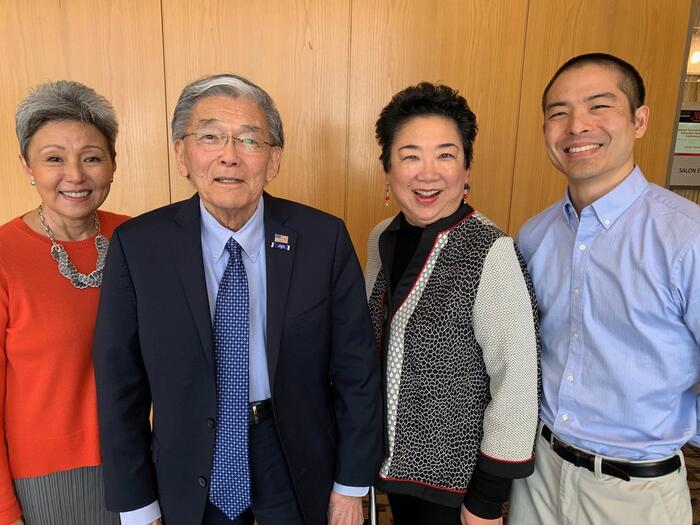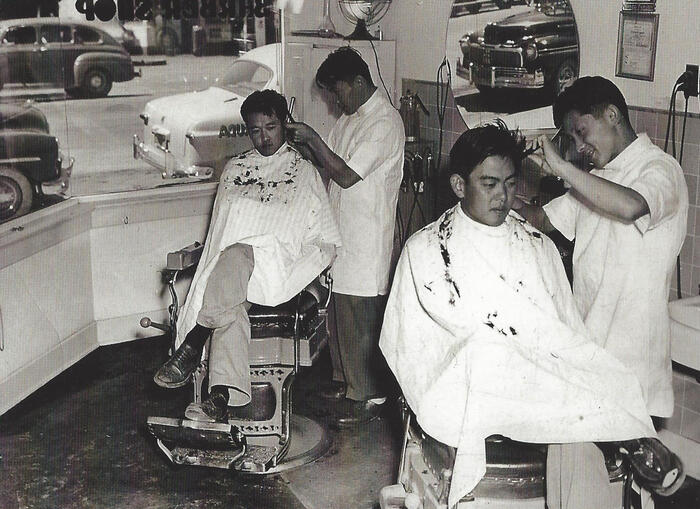Secretary Norman Mineta and His Contributions to SPICE
Secretary Norman Mineta and His Contributions to SPICE
The late Secretary Mineta was unwavering in his commitment to SPICE’s efforts to educate students about civil liberties and equality.

As a young student in San Jose in the 1960s and early 1970s, I used to see Norman Mineta on occasion in San Jose’s Japantown. Once at Jackson Barber Shop in Japantown, Norm was on the barber chair. After he left, barbers Takeo and Atsuo Fukuda asked me if I knew who he was. I didn’t, and Takeo told me that he was Norman Mineta, vice mayor of San Jose. That was the first time that I sat next to him, and the last time (photo above) was on September 20, 2019, just a few months prior to the pandemic.
Since that day at Jackson Barber Shop, I recognized Norm whenever I saw him in Japantown, in the San Jose Mercury News, and in the national news. Whenever I met with him as mayor, congressman, or secretary, I was struck by how he remembered members of my family in San Jose. His capacity for empathy is something that I have admired since my youth and aspire to in my adulthood. Norm’s passing on May 3, 2022 prompted me to recall our work together on several education-focused projects that were deeply personal to him and to me.
Norm’s life story—including his family’s incarceration in Heart Mountain Relocation Center by the U.S. government during World War II—is eloquently captured in the remembrance, “Remembering Mineta as unselfish American,” which was written by Daniel Okimoto, Professor Emeritus, Stanford University. Norm’s life is also brilliantly captured in the film, Norman Mineta and His Legacy: An American Story, by Dianne Fukami and Debra Nakatomi, Mineta Legacy Project. According to Fukami and Nakatomi, the film is about injustice and redemption, and Norm’s burning desire for all people to be treated equally. That desire was influenced greatly by his childhood incarceration experience. I often heard Norm talk about the anguish and heartbreak he felt as a 10-year-old when his family was taken from their San Jose home in 1942 and he was forced to leave behind his dog, Skippy.
In the early 2000s, I consulted with him about SPICE’s curricular work on a comprehensive curriculum unit that focused on the incarceration of Japanese Americans during World War II and a teacher’s guide for the film, Uncommon Courage: Patriotism and Civil Liberties, directed by gayle yamada. The curriculum helps to raise public awareness concerning the history and the lessons of civil rights violations or civil liberties injustices experienced by certain communities—something that Norm experienced first-hand as a child. The teacher’s guide helps teachers to set the context for and to debrief the viewing of the film that tells the story of the Military Intelligence Service (MIS) during World War II and the Allied Occupation of Japan. Approximately 6,000 MIS soldiers, primarily Japanese American, fought for the United States in the Pacific, interrogating Japanese prisoners, translating documents, intercepting communications, and infiltrating enemy lines. Many of the soldiers volunteered from the incarceration camps. While developing the guide, I spoke to Norm about many of the MIS soldiers whom he knew and also about his experiences as an intelligence officer in Japan and Korea in the 1950s.
When I was a board member of the National Japanese American Memorial Foundation, Norm (as one of the founding members of the Memorial) supported the development of educational resources on the Memorial in Washington, DC, which I developed back in the early 2000s with Kerry Yo Nakagawa, Director, Nisei Baseball Research Project. Norm’s quote is inscribed on one of the walls of the Memorial. It reads,

In addition, my colleague, Rylan Sekiguchi, and I had the honor of working in collaboration with the Mineta Legacy Project—specifically with Norm, Dianne Fukami, Debra Nakatomi, and Amy Watanabe—on the development of a comprehensive web-based curriculum called “What Does It Mean to Be an American?” Inspired by the life and career of Norm, the six themed lessons are: Immigration, Civil Liberties & Equity, Civic Engagement, Justice & Reconciliation, Leadership, and U.S.–Japan Relations. Norm also joined Sekiguchi and members of the Mineta Legacy Project in introducing the curriculum at several venues, including the U.S.-Japan Council annual conference in Tokyo (November 2018); National Council of History Education conference in Washington, DC (March 2019); Ronald Reagan Presidential Library in Simi Valley, California (April 2019); and the National Council for the Social Studies annual conference in Austin, Texas (November 2019). Note: The photo above was taken at the National Council of History Education conference, Washington, DC; Secretary Norman Mineta with Nakatomi (left) and Fukami (right) and Sekiguchi.
Lastly, in spring of 2021, I was asked by Stanford’s Center for East Asian Studies for recommendations for a keynote speaker for the CEAS commencement. The first person who came to mind was Norm, and he accepted CEAS’s invitation. I will always remember his important words—that there are two things to always cherish and to hold dear to your heart no matter what the situation. These are your name and integrity.

During the keynote address, my mind periodically drifted back to my first encounter with Norm at Jackson Barber Shop. Today, May 30, 2022, Memorial Day, I walked past the location of where Jackson Barber Shop once stood. I recalled the first time that I saw Norm and remembered Atsuo and Takeo, who are shown in the photo (1950s) above where Takeo (near the window) is cutting my father’s hair and Atsuo is cutting the hair of one of my father’s best friends. Takeo and Atsuo’s family was in the same block as my father and his family in Poston War Relocation Center in Arizona. Takeo used to cut my hair, and I remember talking with him about one of my relatives, Hachiro Mukai, who was drafted into the U.S. Army from Poston and was killed in action in France. Norm wanted Hachiro’s story (and others like it) to be transmitted to future generations. I will always remember that and his support of SPICE’s educational efforts over the years. Note: Photo of Jackson Barber Shop, courtesy Chiyo Fukuda.
At the COPANI XX conference in San Francisco, I shared the photo of Jackson Barber Shop with Norm and we shared not only some sadness about the bygone years of many Japantown businesses but also some laughter too, as he said that I still needed a haircut.



